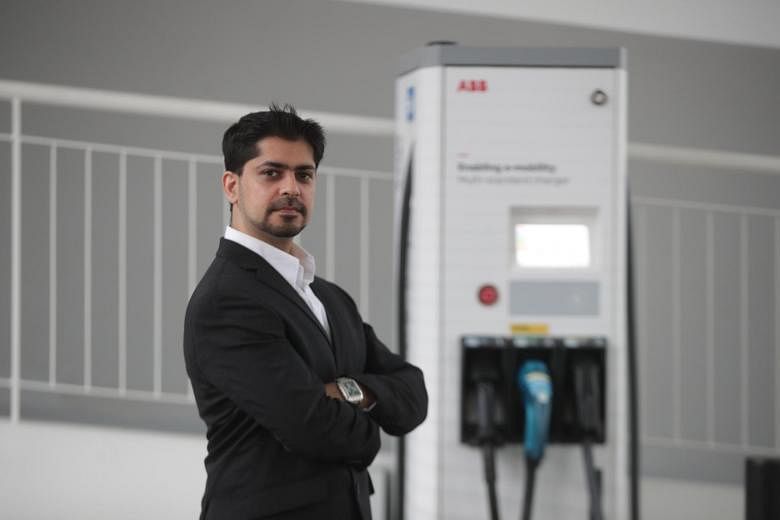SINGAPORE - Mr Kumail Rashid, Asia-Pacific e-mobility division lead of electric vehicle charging infrastructure builder ABB, addresses concerns such as costs and battery issues.
Q: One of the main worries of electric vehicle (EV) buyers is battery degradation. Although batteries are under warranty, claiming can be inconvenient. Replacing batteries is a drain on resources too.
A: Current lithium-ion battery packs in electric vehicles are estimated to be serviceable for 10 years or longer. All batteries degrade over a long period of time, but that can be slowed down.
It will be most optimal to charge EVs to 80 per cent and then switch to slow charging for the remaining 20 per cent.
EV manufacturers have taken an active role in the battery management system to ensure the battery does not start degrading after just a few years.
With a mix of sophisticated battery management systems and cooling technologies, most EVs have shown excellent performance which will only improve over time.
Q: Another battery-related worry is fire. Unlike internal combustion engine fires, lithium fires release toxic fumes and require special fire-fighting methods to put out. How can owners mitigate this fire risk, especially when more than 80 per cent of Singaporeans live in high-rises?
A: Some EV makers have engineered battery management systems with sensors and protection devices, such that the battery will be disconnected when the pack is about to sustain damage.
In addition, as lithium-ion batteries operate at a temperature range of 15 to 45 deg C, battery cooling systems are important to ensure effective thermal management, which will mitigate the risk of fire.
We need to adopt recognised standards for EV batteries and charging, with regulations ensuring manufacturers adhere to a common safety standard.
This will prevent a replay of what happened with personal mobility devices, which saw a range of devices designed with inconsistent fire safety protocols.
The Land Transport Authority's recent review of electric vehicles and chargers is a step in the right direction. It has also formed the National Electric Vehicle Centre, which will lead efforts to review EV regulations and standards.
All these measures give consumers peace of mind when buying an EV.
Q: A main proposition of EVs is that they are environmentally friendlier. But lithium-ion batteries are relatively hard to recycle.
A: Beyond having significant after-life use in stationary energy storage applications, building more specialised recycling facilities might be one way to aid the recycling of batteries.
Singapore will be implementing a regulated e-waste management system by next month, mandating that companies importing, manufacturing EVs and EV batteries in Singapore be responsible for the collection and recycling of batteries.
Q: In Singapore, public charging is at least twice as costly as home charging. As such, an EV owner's running cost may not be very different from what a hybrid owner experiences. Plus, with all the other attendant costs associated with EVs, it may make more sense to own a hybrid.
A: I like to look at it from the ultimate goal of achieving a future that is safe, smart and sustainable.
Yes, public charging will likely always be costlier than charging at home, but total cost of ownership - which is always key when comparing EVs with combustion vehicles - will continue to improve for EVs.
Innovations could also help bring down public charging costs over time. For instance, in buildings which use both solar and grid power, EV charging stations can be integrated into a central energy management system, which will ensure efficient energy use and maximise the use of renewable energy.
Q: Do people buy cars which save the world, or are they driven more by budget considerations? Hybrids have been here for three decades, yet they make up less than 7 per cent of the car population.
A: We are still in the early stages of EV adoption. But like any other green option, there will be people who are conscious about the environment and are early adopters.
Budget considerations remain important, which is why the Government continues to incentivise through rebates and other measures.
EVs have not reached cost parity with combustion vehicles, but the trend is heading in this direction, with BloombergNEF (a clean energy research group) forecasting that we will reach parity by 2025.


